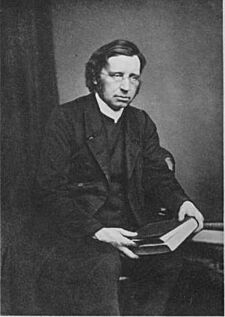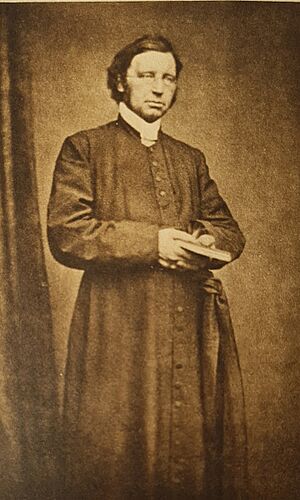John Mason Neale facts for kids
Quick facts for kids John Mason Neale |
|||||||||
 |
|||||||||
| Born | 24 January 1818 in London, England | ||||||||
|---|---|---|---|---|---|---|---|---|---|
| Died | 6 August 1866 (aged 48) in East Grinstead, England | ||||||||
| Church | Church of England | ||||||||
| Ordained | 1841 | ||||||||
|
|||||||||
John Mason Neale (born January 24, 1818 – died August 6, 1866) was an English Anglican priest, a very smart scholar, and a talented hymnwriter. He spent his life working on and writing about many old Christian texts, including hymns from the Middle Ages. Some of his most famous hymns include the well-known 1853 carol Good King Wenceslas, which is often sung around Boxing Day. Neale's work is especially popular in churches that follow more traditional Anglican practices.
Contents
His Life and Work
John Mason Neale was born in London, England, on January 24, 1818. His father, Cornelius Neale, was also a clergyman. John went to Sherborne School and then to Trinity College, Cambridge. Even though he was excellent at classical studies, he found mathematics difficult.
When he was 22, Neale became a chaplain at Downing College, Cambridge. He was very interested in church architecture and helped start a group called the Cambridge Camden Society. This group wanted churches to have more traditional decorations and rituals, similar to older Gothic styles. Neale was ordained as a priest in 1842.
He briefly worked in Crawley, Sussex, but had to stop because of a long-term lung illness. He then lived in the Madeira Islands for a winter, where he researched for his book, History of the Eastern Church. In 1846, he became the head of Sackville College, a special home for elderly people in East Grinstead. He stayed there until he passed away.
Helping Others and Facing Challenges
In 1854, Neale helped create the Society of Saint Margaret. This was a group of women in the Church of England who dedicated themselves to nursing the sick. At that time, some people were unsure about new religious groups forming in the Anglican Church. Because of his work, Neale sometimes faced strong opposition. He received no special honors in England, but he did get a special doctorate degree from Trinity College in Connecticut, USA.
He also helped start the Anglican and Eastern Churches Association in 1864. This group aimed to build connections between the Anglican and Eastern Orthodox Churches. One important result of this group was the book Hymns of the Eastern Church, which Neale edited and published in 1865.
Neale believed strongly in traditional church practices, which sometimes caused problems with his bishop. For a time, he was even stopped from preaching. He translated many old church songs from Latin and Greek into English. Thanks to him, English-speaking churchgoers learned about many ancient hymns from different parts of the world.
Famous Hymns He Translated
John Mason Neale is best known for his amazing work as a hymnwriter and translator. He brought many beautiful ancient and medieval hymns into English. For example, the tune for Good King Wenceslas comes from an old Latin springtime poem.
Some of his famous translations include:
- "All Glory, Laud and Honour"
- "A Great and Mighty Wonder"
- "O Blest Creator of the Light"
- "O come, O come, Emmanuel"
- "Of the Father's Heart Begotten"
- "Sing, My Tongue, the Glorious Battle"
- "To Thee Before the Close of Day"
- "Ye Sons and Daughters of the King"
Death and Legacy
John Mason Neale passed away on August 6, 1866. This day is known as the Feast of the Transfiguration in the church calendar. Because of this, Anglican churches remember him on the following day, August 7. He is honored in the Church of England and the Episcopal Church on that day.
Neale is buried in St Swithun's churchyard in East Grinstead.
His Published Works
John Mason Neale wrote many books and hymns during his lifetime.
Sermons
- Sermons for the Black Letter Days (1868)
- Sermons for Children (1869)
- Sermons on the Blessed Sacrament (1870)
Hymns and Carols
Neale's most lasting and widely known contribution is to Christmas music. He helped make these carols famous:
- Good Christian Men, Rejoice, a Christmas carol
- Good King Wenceslas, his original legendary Boxing Day carol
- O come, O come, Emmanuel, an Advent hymn translated from old "O Antiphons" sung before Christmas
He also wrote:
- A Great and Mighty Wonder, translated from the Greek of St Germanus.
Hymn Books He Compiled
- Hymnal Noted (1851)
- Mediaeval Hymns and Sequences (first edition 1851)
- Hymns of the Eastern Church, translated with Notes and an Introduction (1870 edition)
Theological and Historical Books
- A History of the Holy Eastern Church (1847)
- Essays on Liturgiology and Church History (1863)
- A commentary on the Psalms (1868)
Books Related to Cambridge Camden Society
- The history of pews (1841)
- A few words to churchwardens on churches and church ornaments (1842)
Novels
- Theodora Phranza; or, the Fall of Constantinople (1857)
Poetry
- Edom: A Seatonian Poem (1849)
- Sinai: A Seatonian Prize Poem (1857)
 | Anna J. Cooper |
 | Mary McLeod Bethune |
 | Lillie Mae Bradford |


